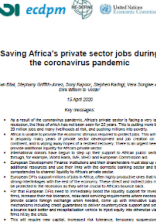Saving Africa’s private sector jobs during the coronavirus pandemic

Africa is facing a series of shocks that are leaving many jobs and livelihoods at risk. By early February 2020, and without a single case of the coronavirus, Africa was already facing severe economic consequences as a result of the pandemic (Raga and te Velde, 2020). Recently, the combination of global economic recession and domestic lockdowns has hit African countries hard. Exports have plummeted and capital has flown out. The effects have been particularly harsh for Africa’s private sector jobs, putting at risk development and transformation achievements made over the past 10 years. Poverty will increase rapidly.
Rescue stimulus packages in developed countries are providing a balanced and ambitious approach and recognise public and private sector challenges. Not so in poorer countries, which cannot match the firepower of developed countries to engineer a sizeable stimulus. Meanwhile, where donor support has been forthcoming, it is all too often neglecting or insufficiently supporting the private sector. This note argues that additional liquidity and longer-term funding need urgently to be made available to protect jobs and past transformation efforts.
This note discusses the latest evidence on the socioeconomic costs of the coronavirus in Africa (Section 2). It then discusses the economic policy response in Africa (Section 3). Section 4 discusses emerging international donor responses, especially from Europe. Section 5 argues there is a lack of attention in the international and European donor responses to supporting the private sector, unlike the response within Europe itself. Without such support, there will be no private sector to lead the recovery and pull Africa out of the recession.